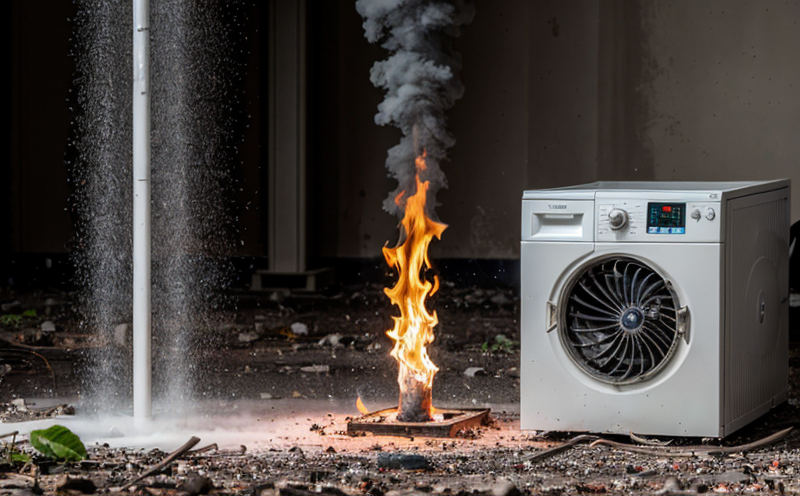IEC 63115 Environmental Stress Testing of Stationary Lithium Batteries
The International Electrotechnical Commission (IEC) standard IEC 63115 is a globally recognized benchmark for the environmental stress testing of stationary lithium batteries. This standard ensures that battery systems can withstand various environmental stresses, including temperature and humidity variations, ensuring their reliability and longevity.
Stationary lithium batteries are widely used in energy storage systems (ESS), uninterruptible power supplies (UPS), and other applications where consistent performance is crucial under varying conditions. IEC 63115 provides a structured approach to testing these batteries by exposing them to controlled environmental stressors that mimic real-world conditions they might encounter during their lifecycle.
The testing protocol outlined in IEC 63115 involves subjecting the battery to specific temperature and humidity ranges, as well as other environmental factors such as altitude changes. The goal is to identify any potential weaknesses or failures within the battery's structure before it reaches its operational environment. This proactive approach helps manufacturers improve product quality and ensures regulatory compliance.
The testing process typically includes several stages:
- Initial charge and conditioning of the batteries
- Exposure to different temperature and humidity levels
- Monitoring of battery performance parameters during exposure
- Data collection and analysis
- Determination of pass/fail criteria based on specified acceptance limits
The standard specifies detailed procedures for setting up the test environment, including specific temperature and humidity ranges that vary depending on the intended application. For example, ESS batteries may be subjected to more extreme conditions than UPS batteries due to their different operational requirements.
IEC 63115 also covers battery systems with capacities from 0.5 Ah up to 200 Ah, making it versatile for a wide range of stationary applications. The standard's comprehensive nature ensures that all relevant aspects of environmental stress are considered, providing a robust testing framework.
By adhering to IEC 63115, manufacturers can enhance product reliability and customer satisfaction by ensuring their batteries meet the highest quality standards. This not only helps in avoiding failures but also builds trust with regulatory bodies and end-users.
| Environmental Stress | Test Conditions | Application Example |
|---|---|---|
| Temperature Cycling | -40°C to +85°C | Data Centers with UPS Systems |
| Humidity Range | 10% RH to 93% RH | EES Systems in Coastal Regions |
| Voltage Changes | ±20% of nominal voltage | Backup Power Supplies for Hospitals |
The testing process is crucial not only for ensuring product reliability but also for meeting stringent regulatory requirements. Many countries and regions have adopted IEC 63115 as a mandatory standard, making compliance essential for international manufacturers.
In summary, IEC 63115 provides a comprehensive approach to environmental stress testing of stationary lithium batteries, ensuring that these critical components can perform reliably under various conditions. This standard is particularly important for industries like renewable energy and telecommunications, where uninterrupted power supply is paramount.
Benefits
The implementation of IEC 63115 Environmental Stress Testing offers several key benefits to manufacturers and end-users:
- Enhanced Reliability: By subjecting batteries to real-world environmental stresses, this testing ensures that they can withstand the rigors of operational environments.
- Improved Quality Assurance: The structured approach provided by IEC 63115 helps manufacturers identify and rectify potential issues early in the production process.
- Regulatory Compliance: Adherence to this standard ensures that products meet international regulatory requirements, facilitating easier market access.
- Prolonged Product Lifespan: Testing batteries under stress conditions helps manufacturers design longer-lasting products, which is especially important for ESS applications.
- Customer Trust: Consistent quality and reliability build trust with customers, enhancing brand reputation.
In conclusion, IEC 63115 is a vital tool for ensuring the robustness of stationary lithium batteries in various applications. By investing in this testing process, manufacturers can deliver high-quality products that meet both performance expectations and regulatory standards.
Industry Applications
IEC 63115 Environmental Stress Testing is widely used across multiple sectors where the reliability of stationary lithium batteries is critical. Here are some key applications:
- Renewable Energy Storage Systems (ESS): ESSs rely on lithium batteries to store energy from renewable sources like solar and wind, ensuring a stable power supply.
- Telecommunications Infrastructure: Backup power supplies in telecom towers must be reliable even under extreme environmental conditions.
- Data Centers: UPS systems in data centers need to provide uninterrupted power during unexpected outages or natural disasters.
- Hospitals and Critical Care Facilities: Uninterruptible Power Supplies (UPS) are essential for maintaining critical medical equipment during power interruptions.
| Industry Sector | Battery Application | Main Use Case |
|---|---|---|
| Renewable Energy | EES Batteries | Storing energy from intermittent sources |
| Telecommunications | UPS Systems | Maintaining network stability during outages |
| Data Centers | Backup Power Supplies | Avoiding data loss and downtime |
| Hospitals | Critical Medical Equipment UPS | Ensuring continuous power supply for life-support systems |
The diverse range of applications underscores the importance of IEC 63115 in providing a robust testing framework that meets the unique demands of each sector.
Customer Impact and Satisfaction
Adopting IEC 63115 Environmental Stress Testing can significantly impact customer satisfaction by ensuring product reliability and performance. Here are some ways it benefits customers:
- Increased Product Lifespan: By identifying potential issues early, manufacturers can design batteries that last longer.
- Enhanced Performance Consistency: Testing under controlled environmental conditions ensures consistent performance across all units produced.
- Fewer Failures in Operational Environments: This testing minimizes the risk of failures during critical operations, reducing downtime and associated costs.
- Better Brand Reputation: Consistent quality and reliability build trust with customers, enhancing brand reputation.
In addition to these tangible benefits, IEC 63115 also helps businesses comply with international standards, which is crucial for expanding into global markets. This compliance not only reduces the risk of non-compliance penalties but also opens up new opportunities for growth and innovation.
By investing in this testing process, manufacturers can deliver products that meet both performance expectations and regulatory standards, ultimately leading to higher customer satisfaction and loyalty.





